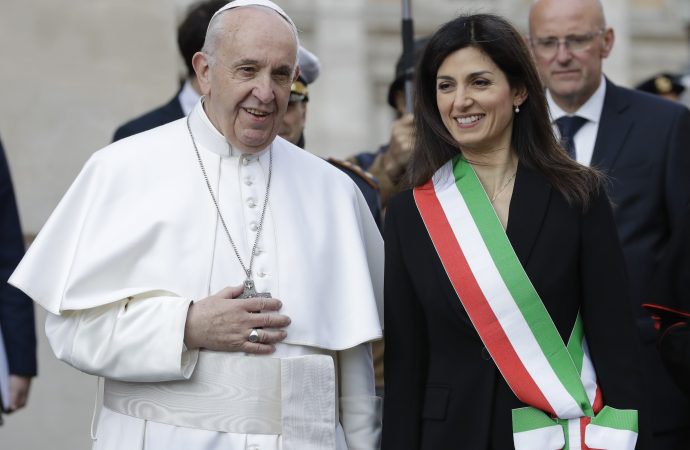Pope Francis joined forces with civil representatives of the city of Rome on Tuesday to recall the city’s history of welcoming and integration, as Italian politics continue to take a populist turn.
“Rome has a universal vocation,” the pope said during his speech at the Roman Capitol March 26. “It carries a mission and an ideal aimed at overcoming mountains and seas and to be shared with everyone, near and far, regardless of which people they belong to, whichever language they speak and whatever color is their skin.”
Francis met the mayor of Rome, Virginia Raggi, and other officials. He also had a private meeting with Raggi. The mayor dedicated a room in the Capitol to the pope’s encyclical on the environment Laudato Sì’. She also dedicated a scholarship in the encyclical’s honor.
Francis and the mayor underlined the importance of integration and and being welcoming for the city of Rome. Italy’s current Minister of the Interior, Matteo Salvini, heads the right-wing populist party, the Northern League, that has made border security and immigration control a priority.
So far, Salvini has closed all Italian ports to migrant vessels and applied severe penalties for undocumented immigrants. His policies are popular, and he is currently leading the polls for who might become prime minister in the next election.
“Rome was able to welcome and integrate various populations and peoples from every part off the world, belonging to the most diverse social and economic categories without eliminating legitimate differences, without humiliating or crushing the respective individual characteristics and identities,” Francis said, referring to the eternal city’s history.
Because of its multi-faith and multicultural heritage, the pontiff called Rome a “zipper city” that brings together “the continental north and the Mediterranean world, the Latin and German civilizations, the prerogatives and powers belonging to civil authorities and those belonging to the spiritual authorities.”
The distinction between the temporal and the spiritual was born in Rome, Francis continued, and in this city are compelled “to constantly dialogue, to stably collaborate in reciprocal respect.”
Because of its diversity and complexity, the city of Rome (of which the pontiff is also the bishop) is difficult to govern and administrate, Francis said, adding that “humble and dedicated care and creative courage” are necessary to ensure that the new generations don’t forget the lessons of the past.
“It’s essential,” the pope said, “that Rome remain at the level of its duties and it history, that it be able even in today’s changed circumstances to be a lighthouse of civilization and a mentor of welcoming, that it not lose the wisdom made manifest in the ability to integrate and make everyone fully participant in a common destiny.”
To do this, Francis promised the support and collaboration of the Catholic Church with private and civil institutions to ensure a proper welcoming and aid to those living on the margins of society, including the poor and refugees.
The pope acknowledged the arrival of “numerous migrants fleeing from wars and misery, who try to rebuild their existence in conditions of security and a dignified life,” in many of the Roman peripheries. Only by drawing from its legacy will Rome, “the city of welcoming,” be able to face this “epochal challenge,” Francis said.
“The Holy See wishes to collaborate more and better for the good of the city, for the service of everyone, especially the poorest and disadvantaged, for the culture of encounter and an integral ecology,” he added.
The pope’s words were echoed by Raggi, who was elected Mayor of Rome June 2016 as part of the left-leaning populist Five Star Movement that rules Italy in a coalition with the Northern League.
“Thinking about future generations, we are committed every day so that Rome occupies its rightful place, to always make it a more open and pluralistic metropolis,” Raggi said in her speech. “The image of Bernini’s colonnade represents, not only symbolically, Rome’s vocation: With arms always open to the world.”
The city of Rome welcomes all of the diplomatic representatives of the world in a spirit of constant dialogue, Raggi added, making it “an open city, a city of multilateralism and multiculturism.”
The heads of the civil and spiritual authorities of the city joined to salute the crowd from a balcony in the Capitol, placed on the Capitoline Hill, or Campidoglio, in Rome. Francis began his speech by saying “Dear Romans, Good Morning!” reminiscent of his first greeting - “Good evening!” - when he was elected pope.
“Today and every day, I would like to ask each of you, according to your abilities, to care for one another, to be close to each other and to respect each other,” Francis said. “This way you will incarnate the best values of this city: A united community, living in harmony, that acts not just for justice, but in a spirit of justice.”

